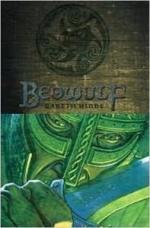{They also see the dragon.}
95 The worm
on the field, in front of them lying,
The
foeman before them: the fire-spewing dragon,
Ghostly
and grisly guest in his terrors,
Was
scorched in the fire; as he lay there he measured
Fifty
of feet; came forth in the night-time[5]
100 To rejoice
in the air, thereafter departing
To
visit his den; he in death was then fastened,
He
would joy in no other earth-hollowed caverns.
There
stood round about him beakers and vessels,
Dishes
were lying and dear-valued weapons,
105 With iron-rust
eaten, as in earth’s mighty bosom
A
thousand of winters there they had rested:
{The hoard was under a magic spell.}
That
mighty bequest then with magic was guarded,
Gold
of the ancients, that earlman not any
The
ring-hall could touch, save Ruling-God only,
[103] 110 Sooth-king of Vict’ries gave whom
He wished to
{God alone could give access to it.}
[6](He
is earth-folk’s protector) to open the treasure,
E’en
to such among mortals as seemed to Him proper.
[1] For ‘goda,’
which seems a surprising epithet for a Geat to apply
to the “terrible”
Ongentheow, B. suggests ‘gomela.’
The passage would
then stand: ‘The
old one went then,’ etc.
[2] For ‘segn Higelace,’ K., Th., and B. propose ‘segn Higelaces,’ meaning: Higelac’s banner followed the Swedes (in pursuit).—S. suggests ‘saecc Higelaces,’ and renders: Higelac’s pursuit.—The H.-So. reading, as translated in our text, means that the banner of the enemy was captured and brought to Higelac as a trophy.
[3] The rendering given in this translation represents the king as being generous beyond the possibility of reproach; but some authorities construe ‘him’ (2996) as plu., and understand the passage to mean that no one reproached the two brothers with having received more reward than they were entitled to.
[4] The name ‘Scyldingas’ here (3006) has caused much discussion, and given rise to several theories, the most important of which are as follows: (1) After the downfall of Hrothgar’s family, Beowulf was king of the Danes, or Scyldings. (2) For ‘Scyldingas’ read ’Scylfingas’—that is, after killing Eadgils, the Scylfing prince, Beowulf conquered his land, and held it in subjection. (3) M. considers 3006 a thoughtless repetition of 2053. (Cf. H.-So.)
[5] B. takes ‘nihtes’
and ‘hwilum’ (3045) as separate adverbial
cases,
and renders: Joy in
the air had he of yore by night, etc. He thinks
that the idea of vanished
time ought to be expressed.




